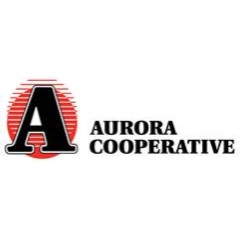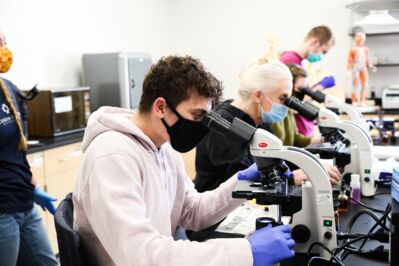
B.S. Agricultural Science
At Concordia Nebraska, we believe in promoting the well-being of God’s creation through a Christ-centered education with our bachelor’s degree in agriculture. Here, you will have the opportunity to prepare for a career in production agriculture or advanced study in an agricultural graduate or professional school. Through Concordia’s ag degree, you will study a broad selection of agriculture courses that look at food production from start to finish so you are ready for careers in fields such as
- Agriculture,
- Natural resource-related sales,
- Ag finance,
- Extension office,
- Government agency,
- Land-use organization,
- Farmer or
- Rancher
Be a steward of God’s earth!
Program Highlights
WHY STUDY AGRICULTURAL SCIENCE AT CONCORDIA?
Concordia University, Nebraska’s agriculture program equips students with a well-rounded and balanced educational program that will challenge you to become an effective communicator, critical thinker and ethical decision-maker. Concordia’s Christ-centered, excellent academics will prepare you to be a leader in the agriculture field through dynamic, real-world learning experiences so you can inspire and serve others and fulfill your calling.
Food Production from Start to Finish
Agribusiness: Learn the fundamentals of agricultural economics and finance to prepare you for service in the ag industry.
Animal Science: Explore the disciplines of animal production, including breeding and genetics, meat science, nutrition and reproductive physiology.
Food Science: Work closely with food producers on best practices for safe crop and animal production to provide food products.
Plant Science: Discover the fundamentals of field and forage crop production, including utilization, yield potential, soil fertility relationships and pest management.
Uzziah Scholars
If you've been successfully admitted to Concordia University, Nebraska and plan to study in an agriculture-related program, you may apply for the Uzziah Scholars where you will be challenged to solve real-world challenges, explore the many facets of agriculture in depth and be a part of creating sustainable, long-lasting and ethically sound agriculture practices for the future.
Learn more about Uzziah Scholars
Industry Partners
Concordia is blessed with partners who are joining us to build together the future ag industry.




MEET OUR EXPERT FACULTY
As experts in agricultural science, our faculty and instructors bring years of experience to the classroom.
Meet our students
“In agriculture, you’re constantly being confronted with things that are beyond your control. That’s why having faith in Christ is so important for the job.”
Olivia Leising
Arapahoe, Neb.
Accreditation
Concordia University, Nebraska is accredited by the Higher Learning Commission, a regional accreditation agency recognized by the U.S. Department of Education.
Degree Goals
An agricultural science program graduate from Concordia University, Nebraska will be able to:
- Solve problems typical of those that arise in the agricultural industry.
- Communicate agriculture concepts and issues clearly in a variety of appropriate ways.
- Demonstrate production and management skills and abilities necessary to successfully farm or ranch and/or provide agricultural services in a professional setting.
Natural Sciences Minors
- Agricultural Science
- Biology
- Chemistry
- Environmental Studies
- Physics
Career Outcomes
Farmer/Rancher
- Produce crops, livestock or other agricultural goods
- Evaluate market conditions, purchase and sell your agricultural products
Agricultural Marketer
- Handle media relations, issue press releases and develop educational materials for an agricultural product or company
- Promote farm and commodity interests in your state or region
Agronomist
- Conduct research and experiments to improve the productivity and sustainability of food crops
- Analyze nutritional content of crops, improve soil treatments or advise crop developers about techniques to enhance production
FAQs
What kind of careers can you get with a degree in agriculture?
Earning your B.S. in agriculture from Concordia University, Nebraska is a great way to gain the knowledge, skills and experience to manage your own agricultural business, or work in ag sales, food production and many other areas of agriculture.
You may choose to
- Own or manage a farm or ranch,
- Work as a soil scientist,
- Become a plant geneticist,
- Sell seed, fertilizer or feed,
- Repair and sell equipment,
- Provide livestock protection insurance
- Work in agricultural or natural resources communications as a print or broadcast journalist or
- Become an agricultural marketer.
Because of the general nature of our agriculture degree, as well as the hands-on experience you’ll earn through your classes and internships, you will be prepared for many different ag career opportunities after graduation.
Should I major in agriculture or agribusiness?
If you’re interested in a career in agriculture, earning your degree in either agribusiness or agriculture can help you achieve your goal. It just depends how much you want to specialize and what type of jobs you want after graduation.
If you know that you want to work on the business side of agriculture, such as owning or operating a large scale farm, working in agricultural sales or agricultural marketing, then agribusiness may be the best choice for you.
If you know you want to work in agriculture, but you’re not sure exactly what field of specialization, or if you know you want to continue your education in agriculture graduate or professional school, then you might choose the more general major in agriculture.
The best way to decide whether to major in agriculture or agribusiness is to meet with your counselor and discuss your future career goals and the agriculture classes you want to take. Either degree will prepare you with the academics and experiences you will need for your desired career in agriculture.
What types of classes are required for a degree in agriculture?
Concordia University, Nebraska’s comprehensive agricultural science program focuses on the four main areas of ag:
- Agribusiness,
- Animal science,
- Food science and
- Plant science.
At Concordia, you’ll learn from local agribusiness professionals on how to solve real-world problems through experiences in the field.
There will also be an introduction to the disciplines of animal production, including breeding and genetics, meat science, nutrition and reproductive physiology.
You’ll learn about the practices and principles of food production, including: crop distribution, growth process, response to environment, grain and forage crops, and their distribution, use, improvement, growth, harvesting and marketing.
You will learn the fundamentals of field and forage crop production; basic knowledge of the biology production and utilization of major food crops climatic zones, where differing cropping systems are used; yield potential, genetics and biotechnology in field crop production; field and forage crop growth and development; and basic tillage systems and equipment, rotations, soils and fertility management, irrigation management and pest management for field and forage crops
Related Programs

Biology
With a degree in biology from Concordia Nebraska, you will be prepared to begin a career in the biological sciences right away, or to continue your education in graduate, medical, dental or veterinary school. As a biology major at Concordia, you learn essential skills such as time management and mastering complex material, as well as studying more in-depth topics such as microbiology, human anatomy and immunology to give you the knowledge you need to be successful in the field of biology.

Environmental Science
The environmental science program at Concordia University, Nebraska will prepare you for a variety of environmental careers by providing a core of required courses in different disciplines. You can then choose your area of emphasis: natural resources, geography, chemistry or business.

Biochemistry
Biochemistry at Concordia University, Nebraska blends biology and chemistry by using molecular principles to investigate essential processes in living systems. You’ll receive a broad background in the natural sciences that prepares you for a variety of post-graduation options, including research positions and graduate studies in biochemistry, professional health disciplines, biotechnology and the chemical and material sciences industries. As a Concordia University student, you’ll benefit from a distinctive blend of faith-based instruction and real-world, hands-on experience that will equip and prepare you to effectively lead in your vocations.
1 Recent graduates attending graduate school or employed within six months of graduation.
2Average Class Size for Representative Subject Most Aligned with Major, Over Last 5 Years.